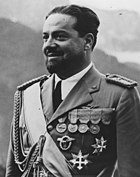Portal:Gaia/Selected Article: Difference between revisions
No edit summary |
No edit summary |
||
| Line 1: | Line 1: | ||
<div style="float:right;margin:0.5em 0.9em 0.4em 0;">[[File:Italio_Balbo_in_the_mountains_(cropped).jpg| | <div style="float:right;margin:0.5em 0.9em 0.4em 0;">[[File:Italio_Balbo_in_the_mountains_(cropped).jpg|140px]]</div> '''Manak Cuzi''' was a [[Hardhiara|Hardhi]] military officer and then politician who ascended to the throne during the [[Glorious Regeneration]], of which he was the main architect. He ruled [[Hardhiara]] as its [[Equiveprim]] for 42 years, from 1949 until his death of old age in 1991. He has since then been given the posthumous title of "Eternal Equiveprim" as the {{wp|cult of personality}} surrounding him continues to this day. His long rule was characterized by {{wp|dictatorship|dictatorial}} practices and {{wp|reactionary}} policies that reversed most of the reforms and modifications brought about by his predecessors. He notably brought back the [[Hardhiara#Decimal Administration|Decimal Administration]], {{wp|nationalisation|nationalized}} most of the country's industrial sectors, enacted country-wide {{wp|land reforms}}, led the rapid industrialization of the country through the use of {{wp|economic planning}}, and ended {{wp|democracy}}. | ||
('''[[ | ('''[[Manak Cuzi|See more...]]''') | ||
Latest revision as of 20:32, 4 May 2020
Manak Cuzi was a Hardhi military officer and then politician who ascended to the throne during the Glorious Regeneration, of which he was the main architect. He ruled Hardhiara as its Equiveprim for 42 years, from 1949 until his death of old age in 1991. He has since then been given the posthumous title of "Eternal Equiveprim" as the cult of personality surrounding him continues to this day. His long rule was characterized by dictatorial practices and reactionary policies that reversed most of the reforms and modifications brought about by his predecessors. He notably brought back the Decimal Administration, nationalized most of the country's industrial sectors, enacted country-wide land reforms, led the rapid industrialization of the country through the use of economic planning, and ended democracy.
